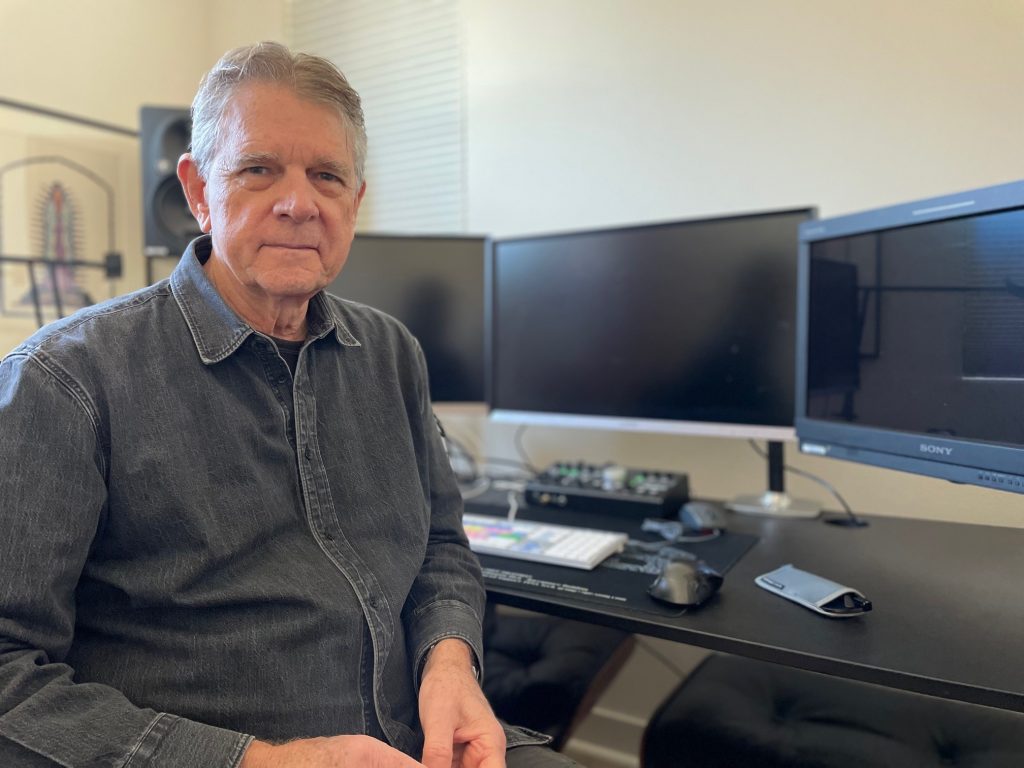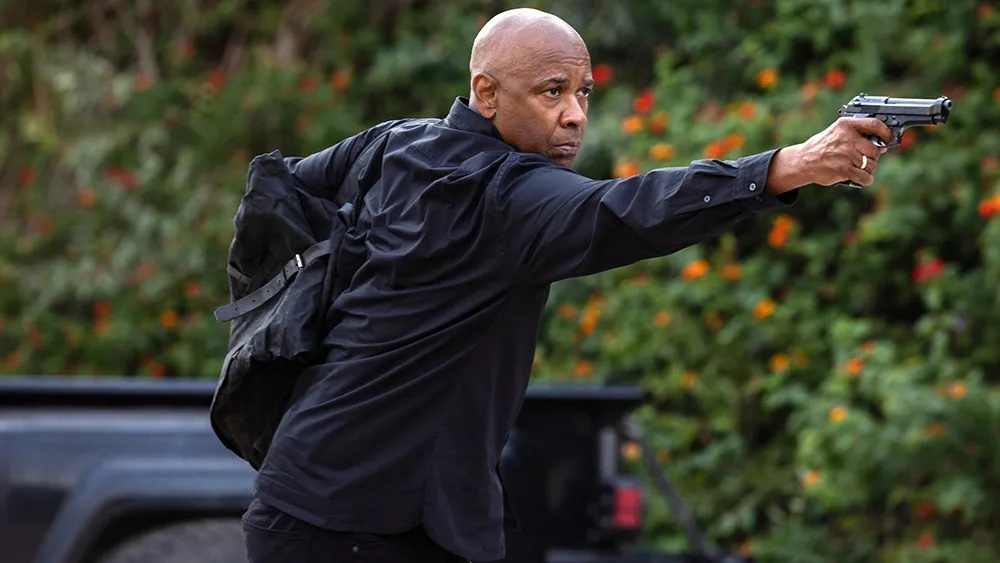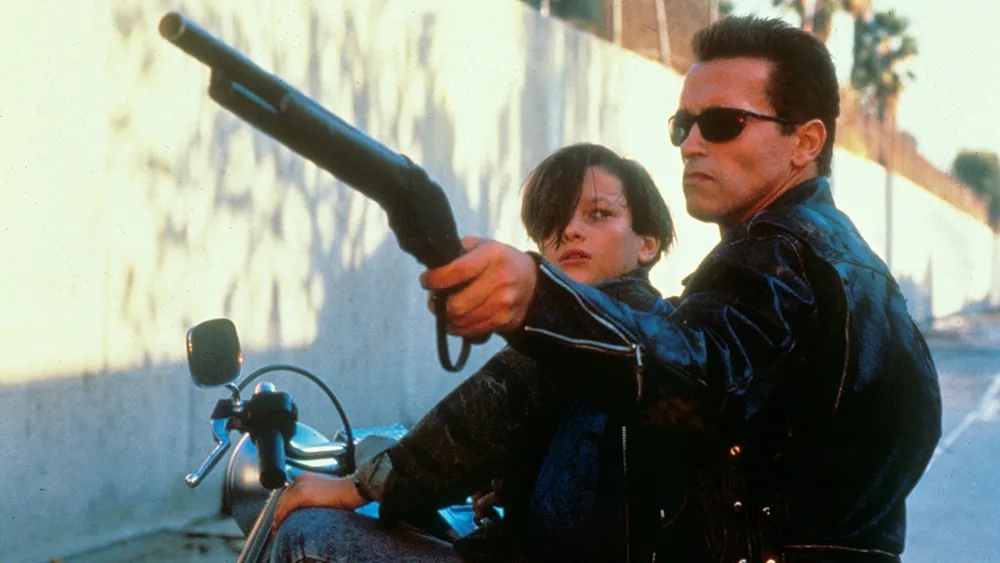
Conrad Buff IV is one of the great editors of action. Throughout his career, he has helped craft crystal-clear spectacles, including his latest work, The Equalizer 3. It’s the latest collaboration between Buff and filmmaker Antoine Fuqua. The duo has worked together several times since Training Day.
Once again, they deliver spectacle with the final installment in The Equalizer franchise, with Robert McCall (Denzel Washington) fighting to protect his new home and family in Italy.
The end result is the most patient addition to the franchise. It’s a film that never rushes itself and focuses more on character and mood than plot. Recently, Below-The-Line had a conversation with Buff about pulling off that patient atmosphere.
While we could list Buff’s credits all day long, just to name a few, he won an Oscar for his work on Titanic, and he edited Spaceballs, Terminator 2: Judgment Day, Arlington Road, and an often overlooked thriller that deserves a shoutout whenever possible, Switchback. During our conversation with the editor about Equalizer 3, which does include spoilers, we also discussed some of his past credits.
Below-The-Line: Equalizer 3 plays fast because of how patient it is. How do you know when you’ve achieved that pace?
Buff: That’s interesting. Yeah, it’s not a fast-paced film. It’s kind of leisurely for something that people sort of expect action in, and it’s fairly intermittent action-wise. But I don’t know. I enjoyed the location and the story. It was a fun one to work on.
Particularly in the first act when McCall is recovering from his altercation, it took a while to get that sort of dialed in, and there were a lot of pieces that were shot by the main unit and second unit of environmental things that Antoine wanted to try and incorporate. So in some ways, parts of it are very documentary and made up in editing as opposed to something on the page.
BTL: For example?
Buff: Well, we had had a preview or two, and the usual dialogue comes up from the studio side of things, which is, “Can’t we get it to move a little faster?” Well, Antoine wasn’t so interested in making it move. It was a different kind of film. When we did try and pace it up here and there, it felt as though we were missing some ingredients, particularly McCall’s attachment, and growing interest in the town itself. So Antoine felt like we’d given sort of short shrift to his interest and potential desire to kind of remain in Altamonte.
He thought, well, maybe we can create a montage incorporating a lot of the ingredients that we had that were not in the film. And so, there’s a piece where we find him sitting at his usual cafe, and he is sort of absorbing all the flavors of the town, children going off to school, fishermen in their boats, just beautiful shots, bells ringing. So none of that was scripted and is born out of a lot of the ingredients that were captured at the time. So it was fun. Parts of it are more documentary and very subjective structurally. So it was fun for me.

BTL: Other than the location, any major similarities between working on Equalizer II and III?
Buff: Well, in the original script, there was a subplot actually, where McCall becomes slightly enamored romantically with not just the town but the girl, the waitress. And that was on the page originally, but in reality, it didn’t work. It didn’t fly. He was still attached to his wife via scenes that were not in as well. There’s a little bit of emphasis in the original cut of him kind of solitary in his room, and he is twisting his wedding ring and putting it in a drawer at one point because it appears that he’s kind of romantically distracted or interested.
But in the end, I don’t think it quite gelled. We had to find a way to extricate it without hurting the film. And also the ending, actually, that scene at the very end of the film structurally lived about a third of the way through the film, the soccer celebration at the end, all the blue smoke and his sort of joining the crowd that was originally a scene that lived much, much earlier.
BTL: How’d that become the ending? How many other options were there?
Buff: Well, there’s one where he returns to the town and encounters the waitress. We were trying to satisfy three different stories. One is the return of the money to the pensioner in Boston. We also had the story of Dakota Fanning’s character and her family, which only a few people who are familiar with Equalizer will understand. But there was also McCall returning to town, encountering the waitress, and ending up staying. But all of those ultimately didn’t have the energy that the conclusion needed. And so, we toyed with and ultimately ended up utilizing the very upbeat celebratory soccer win. I had originally cut the scene without him joining the crowd.
BTL: Why?
Buff: It felt a little premature, but in its new home, that was restored. So he sort of embraces the town. He’s found the place he wants to be, and it becomes the ending of the film. Originally, that was not the case.
BTL: Antoine’s action hits hard. He does not sugarcoat violence. As an editor, how do you want to help him land punches just right?
Buff: Well, in this case, particularly the opening farmhouse scene, there’s an incredibly quiet and slow-paced buildup to the violence, which is so efficient and immediate that the contrast is shocking. And honestly, that bit of action was pretty tightly designed by Leon, the second unit stunt director. I credit him with the design of that, and I just followed his orders essentially in that case. But I know he and Antoine had come up together and collectively designed what they wanted.
The other areas, I mean the Piazza, I guess the standoff between Vincent and McCall, it’s more about tension than any kind of violence. Although I honestly had a tough time watching dailies when McCall is doing Vincent in at the end of the film. Dailies are tough for me to watch.
BTL: Why’s that?
Buff: Well, it came across in the raw form and was pretty sadistic out of context, him constantly following this guy who he’s fed the pills to, who’s six minutes away from dying. When you look at the raw material in a daily form and out of the context of the film, it was strong stuff for me. I mean, I had a hard time, and then I was trying to figure out, well, how do I lighten this to a degree? I had to find a piece of music that would carry the long scene because there are all these multiple steps intercut, and it’s not a fast-paced thing.
A temp piece of music that I chose helped the whole scene. For me, it sort of took the sting off and made it much more palatable in terms of how this fellow deserves it. McCall is helping the town tremendously by getting rid of this guy. I attribute it to music that helped soften the edges and made me much more sympathetic to what I was seeing.
BTL: You’re famous for your clarity, especially your work with James Cameron. When you cut an action scene, what do you want out of it?
Buff: Well, for me it’s always about clarity. What I hate is over-cut stuff where everything is just a blur and any character can look tremendous in their efforts. I want to understand the individual details clearly. I think traditionally I have been successful with that, but it’s not just editorial, although the choices I make help contribute to the clarity for sure. Certainly, the directors are in sync with that idea, especially Jim and Antoine.
BTL: For your choices, though, how do you bring such simplicity to such complex sequences?
Buff: A lot of that is director’s choices, and both Jim and Antoine are similar in that they shoot a lot of material, but the difference with them is they shoot a lot of great material. So it’s very subjective how one can construct it. But the one thing I have to say is I think the clarity within the shots within the takes is there, and it’s up to me to harness the pieces that clarify and tell the story.
Certainly, some of Jim’s major sequences are very complex, and he’s very good at storyboarding just to… Not that we’re following the boards per se, but for him, and Antoine does this as well, they will clarify the sequence for themselves via storyboards when it’s shot. They may depart, but at least they have been programmed with the research and the ideas, and they manage to harness some of the spontaneity on the day that will bend the scene a bit. So they do their homework, I guess is what I’m trying to say.

BTL: Unlike a lot of editors, you started off in visual effects at ILM. How do you think that experience shaped you as an editor?
Buff: I’d been interested in editing for years, even prior to that experience. I worked in television commercials for about five years, and that’s the most succinct storytelling around. But in terms of more narrative features and dramatic work, I was lucky to work on major sequences at ILM. Like with The Empire Strikes Back, the snow battle sequence was in the visual effects world, one of my areas. But Paul Hirsch was the editor on the film, and certainly, he came up with the structure. But the details within a lot of those shots, I was contributing and interpreting what they were looking for and then kind of translating for some of the cameramen who were shooting the individual shots because sometimes they’re very myopic and don’t think in the broader sense. They’re just looking at a shot. But how does that shot relate to the others?
So that experience was good for me, but the process is just, as an editor, is, at least for me, I love the freedom of it because Jim and Antoine and others just say, “Here’s the material, go for it.” The minute I figured out in my early days that don’t try and guess what the director wants, do what you react to within the material that’s been delivered. Make your choices. Don’t try to second guess somebody. Try and tell the story and use pieces that you respond to.
BTL: Great advice for editors there. Your first few credits are so varied, but when you started out, what was your ambition or dream as an editor?
Buff: Well, honestly, when you’re younger, you’re interested in paying your car insurance and your rent. You just hope that you have opportunities in front of you and that certain breaks come your way. The trick is to keep working. If things cross your path, you usually, for economic reasons, have to say yes. So, a lot of that is dictated.
My taste runs to dramatic films. I prefer dark and thrillers generally, but comedies were not my thing per se. I mean, I did do Spaceballs, but that was a very nice opportunity with Mel Brooks. I had done a film called Solarbabies for him, which was my first solo effort. Somehow Mel liked me and said, “I’m going to be doing Spaceballs. It’s a comedy.” I said, “I don’t know anything about comedy, Mr. Brooks.” And he said, “Don’t worry about that, kid.” So, he was great. So that sent me down a different road and a different experience.
BTL: It’s funny to hear the editor of Spaceballs didn’t know anything about comedy.
Buff: Yeah. Well, honestly, I defer to him. He had certain rules editorially, like the most famous one I remember was he was trying to figure out why this scene wasn’t as funny that I had cut, and he realized that I had cut to the joke. I cut to the punchline literally from some character to the punchline. One of his rules was, you never do that. You actually have a lead-up, staying on that character for X number of beats. You’re not cutting immediately to the line that is supposedly comedic. Anyway, he obviously had a hand in directing me on that.
The Equalizer 3 is now playing in theaters.





